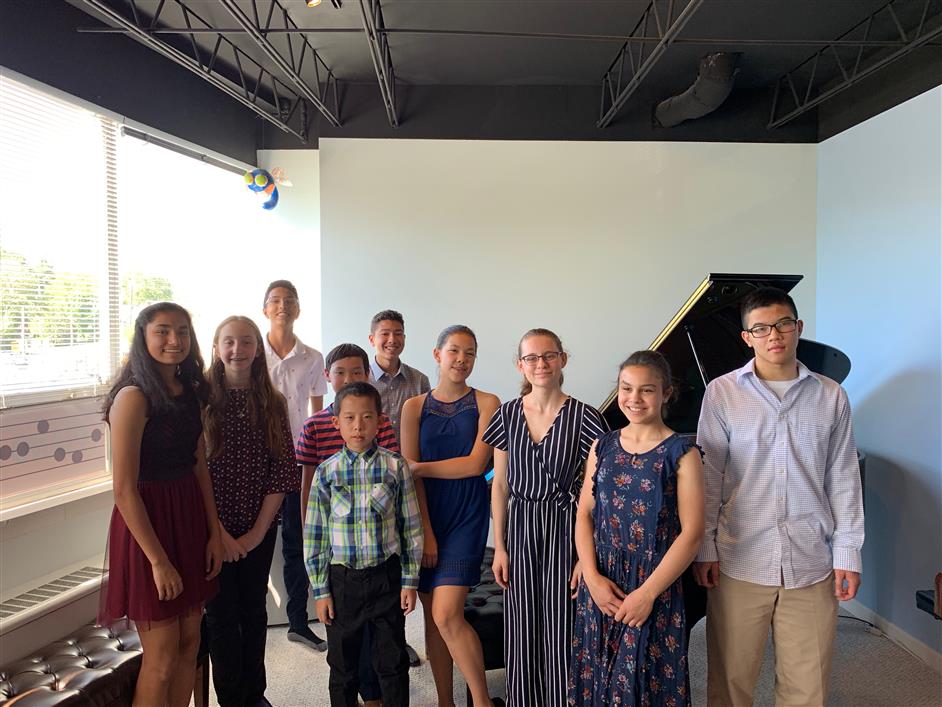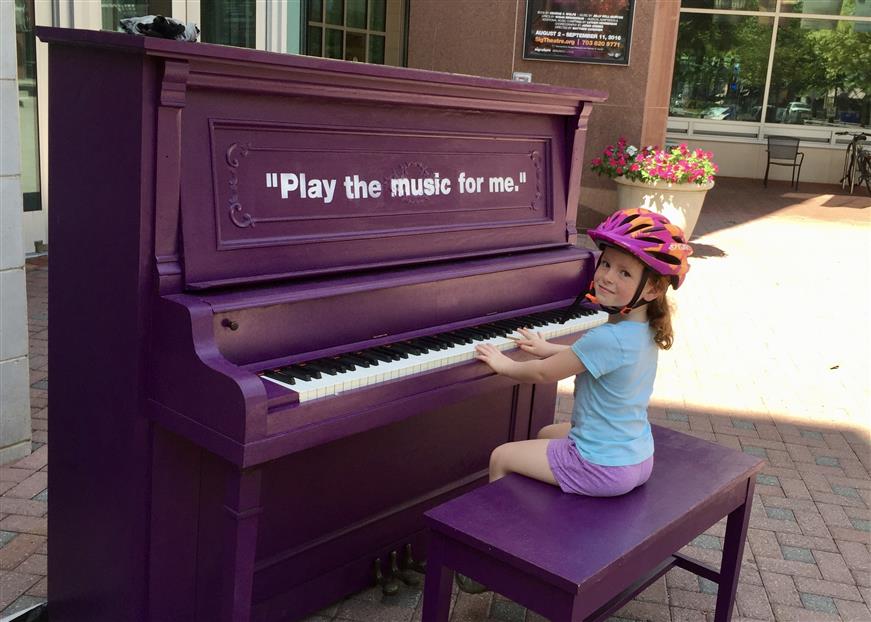Student Honors: NVMTA Achievement Awards & WMTA Hartman Awards
Wednesday, May 15, 2019 | Student Awards and Honors
Congratulations to our student Noah Tennenbaum who received Honorable Mention in the Achievement Awards contest run by Northern Virginia Music Teachers Association on May 4, 2019. In this demanding event, students perform three pieces and receive written comments from three notable judges. Noah performed Prelude and Fugue in D Major WTC 2 (J.S. Bach), Sonata in D Major Op. 10 No. 3 (Beethoven) and Gargoyle No. 3 (Lowell Lieberman).
The following weekend, Noah earned the same award in the Hartman Awards contest run by Washington (DC) Music Teachers Association on May 12, 2019.
Student Honors: Studio Honors Recital 2019
Wednesday, May 1, 2019 | Student Awards and Honors
Seventeen students joined us and performed in our annual Honors Recital, held at the Studio on April 27, 2019. In addition to our performing youth, we were also treated to our teacher Winton Tin Vi La performing Mozart and Ravel. To learn more about our Honors Recital and how we select students for participation, find the info sheet via For Our Students in the menu.
 Congratulations to our performing students:
Congratulations to our performing students:
Morgan Atkinson (Prelude and Fugue in B-flat Major, BWV 866, J.S. Bach), Jeffery Chen (Reverie in f minor, Denis Alexander; Macedonian Mountain DanceAlan Hovaness), Eli Lang (Golliwogg’s Cake Walk, Claude Debussy) , Vihaan Mathur (Intermezzo in D-flat Major, Carolyn Setliff), Katrina Nelson (Gigue from Partita in B-flat Major BWV 825, J. S. Bach), Brandon Pak (Ballade, Op. 100 No. 15, Freidrich Burgmuller), Erin Pak (Minuet in G Major, J. S. Bach), Ai-lan Pho (Sonatina in C Major, Op. 36 No. 3: Allegretto, Muzio Clementi; New Kid on the Block, Jennifer Ecklund), Eliana Rougle (Nocturne in f minor Op. 55 No. 1, Frederic Chopin), Anne Severino (Bourbon Street Beat, Eugenie Rocherolle), Shreya Singh (An Elfin Round, Edward MacDowell), Noah Tennenbaum (Sonata in D Major, Op. 10 No. 3: Presto, Ludwig van Beethoven), Evan Thorn (Medieval Fair, Nancy Faber; Sarabande, William Gillock), Karthik Thyagarajan (Tarentlla, Albert Pieczonka), Alex White (Dream Shadows, William Bolcom), Alex Xu (Elite Syncopations, Scott Joplin), Angelina Yoha (Midwinter Nocturne, Gina Sprunger).
Student Honors: Bach Baroque 2019
Monday, April 8, 2019 | Student Awards and Honors
On April 6, 2019, Northern Virginia Music Teachers hosted its annual Bach Baroque Festival. In this event, students present two Baroque-era pieces. In addition, students have the opportunity to test out their pieces on a harpsichord. The following students earned the top rating of Superior: Noah Tennenbaum and Karthik Thyagarajan. Noah was also selected for the additional award of Honors and performed his piece, the Prelude and Fugue in D Major (WTC 2) at the Honors Recital on April 8.
Student Honors: Golden Key Music Festival 2019
Thursday, April 4, 2019 | Student Awards and Honors
Three of our students earned awards in the Golden Key Music Festival. For this event, student submitted a live and uncut video audition. The following students were honored with awards and have been invited to perform at honors recitals at Carnegie Hall in New York City.
Owen Rollins ♩ Gold Medal
Anuragi Thapliya ♩ Silver Medal
Philip Wang ♩ Silver Medal
Student Honors: NFMC Festival 2019
Thursday, March 21, 2019 | Student Awards and Honors
On March 8 and 9, 2019, many of our students participated in a non-competitive music festival run by Springfield Music Club in collaboration with the National Federation of Music Clubs. Each year, over 100,000 student-events participate nationwide. This year, the following students earned the top grade of "Superior".
Brooks Beck, Jeffery Chen, Jamison Cheng, Olivia-Lena DeVeaux, Valentina Hong, Liam Horgan, Yanson Khuu, Eli Lang, Maya Lang, Matthew Mai, Vihaan Mathur, Roshan Mawji-Ragland, Katrina Nelson, Courtney Nguyen, Kaitlin Nguyen, Lindsay Nguyen, Erin Pak, Seth Peleg, Priya Perakam, Ai-lan Pho, Ryan Qi, Owen Rollins, Eliana Rougle (solo & concerto), Anne Severino, Ian Sigler, Shreya Singh, Skyler Stander, Josiah Sturgill, Noah Tennenbaum (solo & concerto), Anuragi Thapliya, Karthik Thyagarajan, Elena Valdez-Torres, Aruni Veluri, Varun Veluri (solo & concerto), Hannah Wang, Philip Wang, Alexander White, Alex Xu, Angelina Yoha.
Practice Habits of Successful Beginners
Thursday, March 21, 2019 | Practicing and General Education
Who Are We Talking About?
 Ages 5 to 10 in method books labeled level 3 or below.
Ages 5 to 10 in method books labeled level 3 or below.
What Does Success Even Mean?
Students come to class/lesson happy and leave happy (usually). Students complete/finish one or more pieces most weeks. Students find the material accessible, and have no trouble playing pieces together with teacher accompaniments (or with other students) in class. As a result, students demonstrate substantial month-over-month growth in their skill and their understanding of musical concepts.
How Much Parent Support Is Required?
In short: it varies. Many younger students (ages 5, 6 and sometimes 7) will need 100% parent assistance totaling up to three hours per week, meaning they will be unable to implement any of these habits on their own, ever. This is normal for young beginners! On the other end of the spectrum, some slightly-older students (ages 8, 9, 10) might be able to demonstrate all these habits entirely on their own. Typically, even older students will still require parent assistance to maintain all habits consistently.
But How Much Time?
It varies so much by student that it may be better to think in terms of tasks, repetitions, songs played, and most importantly in achievements rather than in minutes. At the very beginning stages of our Bright Starts 1 class, students may get by on just 5-7 minutes per day. More typically, practice could take 30 minutes or even longer. It does not need to, and should not, take exactly the same amount of time every day.
1. Students Practice Daily
It is uncommon to miss more than one day per week, and rare to miss more than two. There are about 38 weeks in the school year*, and students practice at home five or more days per week in at least 34 of these weeks. Students continue a similar routine through many break weeks and at least half of the summer session. At-home practice is independent of lesson attendance: if a student misses a lesson, their practice routine is not affected. (*This is weeks of instruction, not counting weeks with holidays, such as Thanksgiving, Christmas, Spring Break.)
2. Students Complete First Steps Learning Accurately
At the earliest levels, this includes just three elements: notes (sing the note names), fingering/hand position (check the hand position, then sing the finger numbers) and rhythm (say the count). When you are looking at rhythm, both unit counting (half-note, half-note, ta, ta, ta, ta) and metric counting (1, 2, 3, 4, 1, 2, 3, 4) can be helpful. Unit counting is usually simpler for the youngest students to understand and remember.
3. Students Repeat Pieces Multiple Times
Students practice all the pieces on their assignment list each day. The number of repetitions varies from student to student, piece to piece, day to day, and section to section. Students complete multiple repetitions of most pieces or sections. Several times each week, one or more pieces or sections receives six+ consecutive repetitions.
4. Students Play With an External Beat
This can take many forms: playing the student part along with the student; playing the teacher accompaniment along with the student; singing along with the student (sing the words, or note names, or finger numbers, anything works); using the metronome; using the publisher’s recorded accompaniments; using the Piano Maestro or Piano Adventures apps. One or more of these forms happens at least three times each week on all pieces that could be completed in the next two lessons. If the starting tempo is slow compared to the suggested tempo, the student or parent increases it. This may be spread out over many days, especially for fast pieces. Of course, different parents have different skill and comfort levels with these tools. Not all parents will be comfortable with all tools.
5. Parents Assist By Making Limited Corrections...And By Asking and Answering Questions
Be cautious! Praise is way more important than criticism! But, sometimes, a student will practice with the palms of their hands resting on the strip of wood beneath the keys. Sometimes, a student will practice a piece faithfully but never notice the piece contains half notes! While problems such as these certainly can be corrected in lesson, it’s a habit of the most successful students that these and many similar basic issues are noticed at home. Likewise with questions: your child may have questions about how to practice a piece. You may or may not know the answers! But your availability to explore possible answers with students is a success habit.
Feeling Overwhelmed? Relax!
Use this list as a guide, not a straightjacket. Our Studio programs are built to be serious but accessible, and most students will experience progress and positive results even with imperfect habits. Seek to build in missing habits gradually, with a sense of exploration. This little list is intended to describe behaviors that highly-successful students have in common, and is not intended to describe the one and only path to success. Neither is it intended to describe larger issues of effective practice.
Addendum: Ideas for Additional Support
Consider Group Classes
Bright Starts group classes include a lot of time listening, singing, and playing together with others. If you are uncomfortable singing along with your child, or your child resists playing with accompaniments…these habits are built right into our classes.
Observe Lessons
We welcome and encourage observation of lessons. You may be more comfortable answering questions and making small corrections.
Learn Your Child's Music!
Most pieces from book 1 can be played by parents…with just a little bit of practice! Eventually, your child’s skill will probably exceed your own, but by attempting to play your child’s music, you can delay the moment when that happens, perhaps by a year or more!
Practice Partner
Sometimes, finding a practice partner in your neighborhood (an advancing student age 12 to 18) can help students practice at home and can take some of the pressure off parents.
Student Honors: RCM Exams December 2018
Monday, January 7, 2019 | Student Awards and Honors
Two of our students participated in a Royal Conservatory of Music Toronto (RCM) exams in December and their scores have come in! Congratulations to Helena Horowitz (“honors with highest distinction”) and Eliana Rougle (“honors with high distinction”) who each took and passed exams in December. Helena participated at level Prep A, the earliest level (similar to Piano Adventures Level 1/2A and Hal Leonard Levels 2/3). Eliana participated at level 5.
Comprehensive exams are a very common assessment tool and education system for independent music students in many countries…but less so in the U.S. The Royal Conservatory of Music (RCM), a Toronto-based nonprofit music school, offers an exam and certificate program which is accessible yet rigorous, and is available locally. For serious students at any level, RCM exams offer the opportunity for a more comprehensive assessment than our local festivals, yet in a strictly non-competitive environment. It also offers students the opportunity to document and track their achievement. As we continue to explore this program, we hope to have more students participating in the next session in May…and more still in December 2019. If you are interested, or would like to talk more about this opportunity, ask your teacher or Mr. Horowitz.

